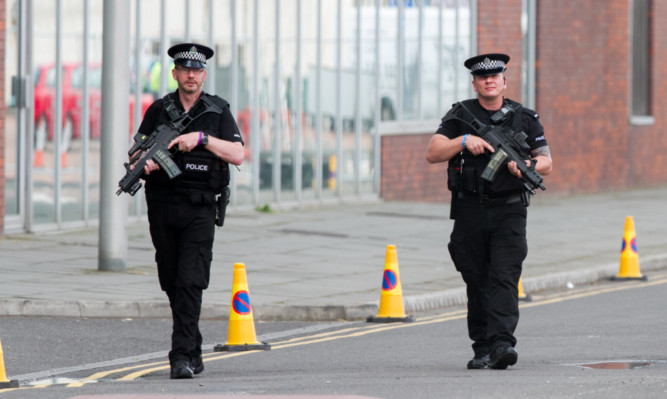Armed police officers being routinely allowed to carry guns on Scotland’s streets is proving contentious. Kieran Andrews looks at the reasons for the policy change.
Police Scotland has been dogged by controversy since before the single force even officially started operating.
From the power struggle between Chief Constable Sir Stephen House and Scottish Police Authority chairman Vic Emery, through to a stop and search policy that has led to allegations of made up figures and questionable practices, concerns have been raised.
Nothing has caused quite as much alarm as the secret switching of the policy for when officers can be armed, though. From the start the shift caused consternation, not least because it was not scrutinised by the Scottish Parliament, despite Justice Secretary Kenny MacAskill being briefed on the change.
Previously, many firearms officers had to collect weapons from a locked safe in an armed response vehicle (ARV) under the authorisation of a senior officer, but now they are able to carry them in a holster.
What Police Scotland has done since its launch in April last year is adopt the approach followed by Strathclyde Police, Tayside Police and Northern Constabulary, where specialist officers could carry guns routinely before the creation of the new single force.
Is this a big issue? Police Scotland says it has 275 firearms officers, 1.6% of the force’s personnel, and they are deployed on a shift pattern basis. These specialist officers carry a Taser stun gun and a holstered handgun.
The force says that means, despite the change in policy, there is no swarming of the streets with armed police.
Assistant Chief Constable Bernie Higgins pointed out the deployment of firearms officers has been a long-standing feature of policing in Scotland, where it is deemed necessary and appropriate.
In a letter to justice spokespersons for Holyrood’s parties, ACC Higgins said police “no longer have to stop on their way to an incident and arm themselveswhich can take up to 20 minutes”. He added there are 531 officers in Scotland trained in the use of firearms and 275, including in supervisory positions, are dedicated to firearms.
However, there have been controversial incidents. Many residents in Dundee’s City Quay are unhappy about officers patrolling the area carrying guns while, ironically, Commonwealth Games shooters are staying locally.
There was an outcry in Inverness when two armed officers, the closest to the scene, attended a report of an assault at a fast food restaurant. Local politicians in the Highlands have also clashed with the police for deploying armed police on regular patrols.
In a letter to the leader of Highland Council, David Alston, Sir Stephen said a “range of factors” had been considered before the decision to change the national armed officer policy was made.
He wrote: “I considered that the overt nature of the standing firearms authority, which means 275 dedicated firearms officers are deployed on a shift pattern basis and consequently only a small number will actually be deployed across Scotland at any one time, represents an enhanced capability to respond quickly to appropriate incidents, whilst also enabling those officers to protect themselves and others in circumstances where a delay in doing so would be detrimental to both public or officer safety.”
John Scott QC, chairman of human rights group Justice Scotland, has said this move shows Sir Stephen has too much power.
He told one newspaper: “When it comes to something like armed officers being routinely in attendance at incidents which do not involve firearms, that’s too important to be simply left to the Chief Constable.”
And the Liberal Democrats, who have been some of the fiercest critics of Police Scotland policy, also hit out at the changes.
Justice spokeswoman Alison McInness said: “SNP justice reforms have challenged the nature of policing in Scotland with no consultation whatsoever. Ministers in Edinburgh, and the Chief Constable in particular, cannot ignore the growing discontent over this badly misjudged policy.”
However, David Hamilton, chairman of the Scottish Police Federation’s North Area Committee, countered that any move to bring such a big decision before MSPs would result in it becoming too political.
He said Police Scotland is already “the biggest political football in the country” and pointed to the SPA’s role as watchdog to hold the Chief Constable to account.
Mr Hamilton did concede he could understand people being taken aback by seeing overtly armed officers in situations where their weapons aren’t needed. Tayside’s previous policy meant guns and tasers were concealed within body armour.
He added: “It’s very comforting for all officers to be able to call on support from our armed officers. It’s also important that police officers with armed functions are able to do duties beyond just being on standby.”
Although Mr Hamilton pointed out that ultimately the policy is the Chief Constable’s call, he said there is “perhaps a middle ground that can be found” so officers can get on with their work without political fanfare.
Any such compromise looks rather far away at the moment.
